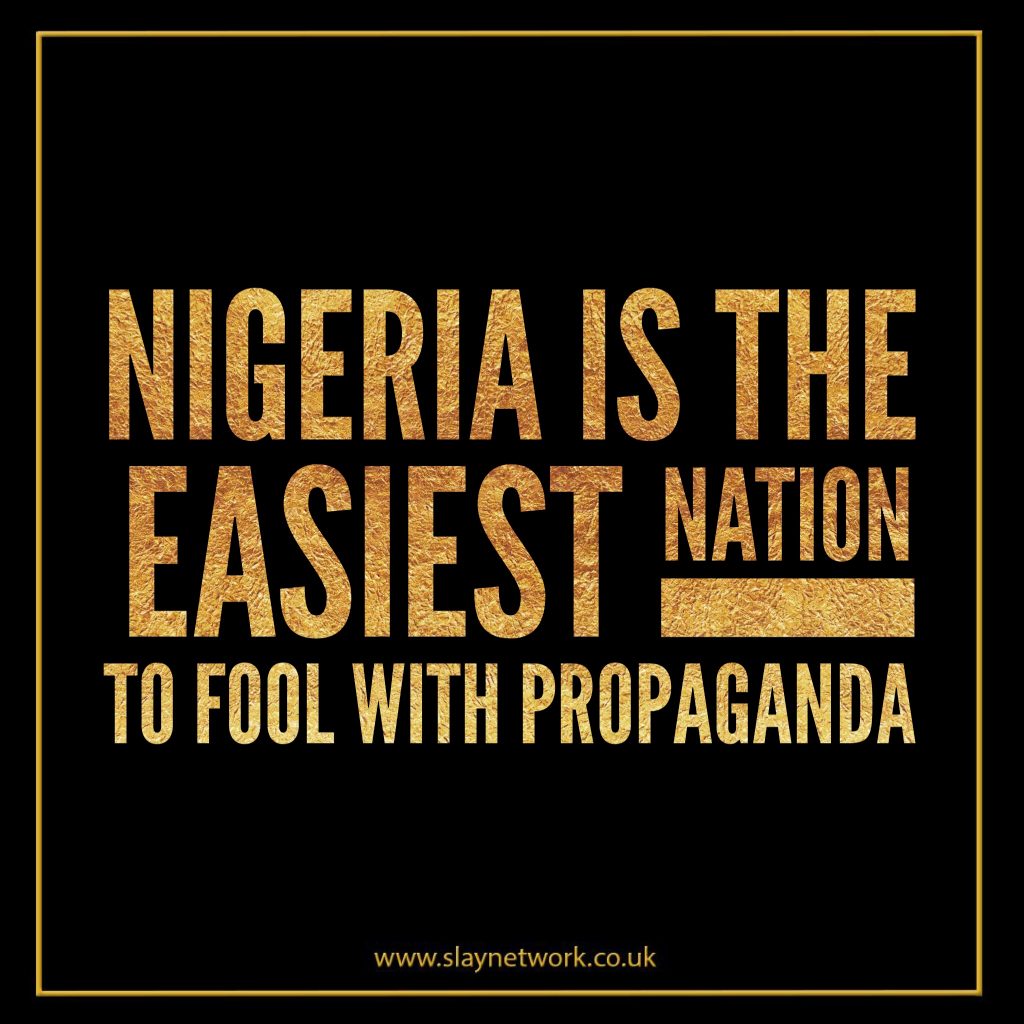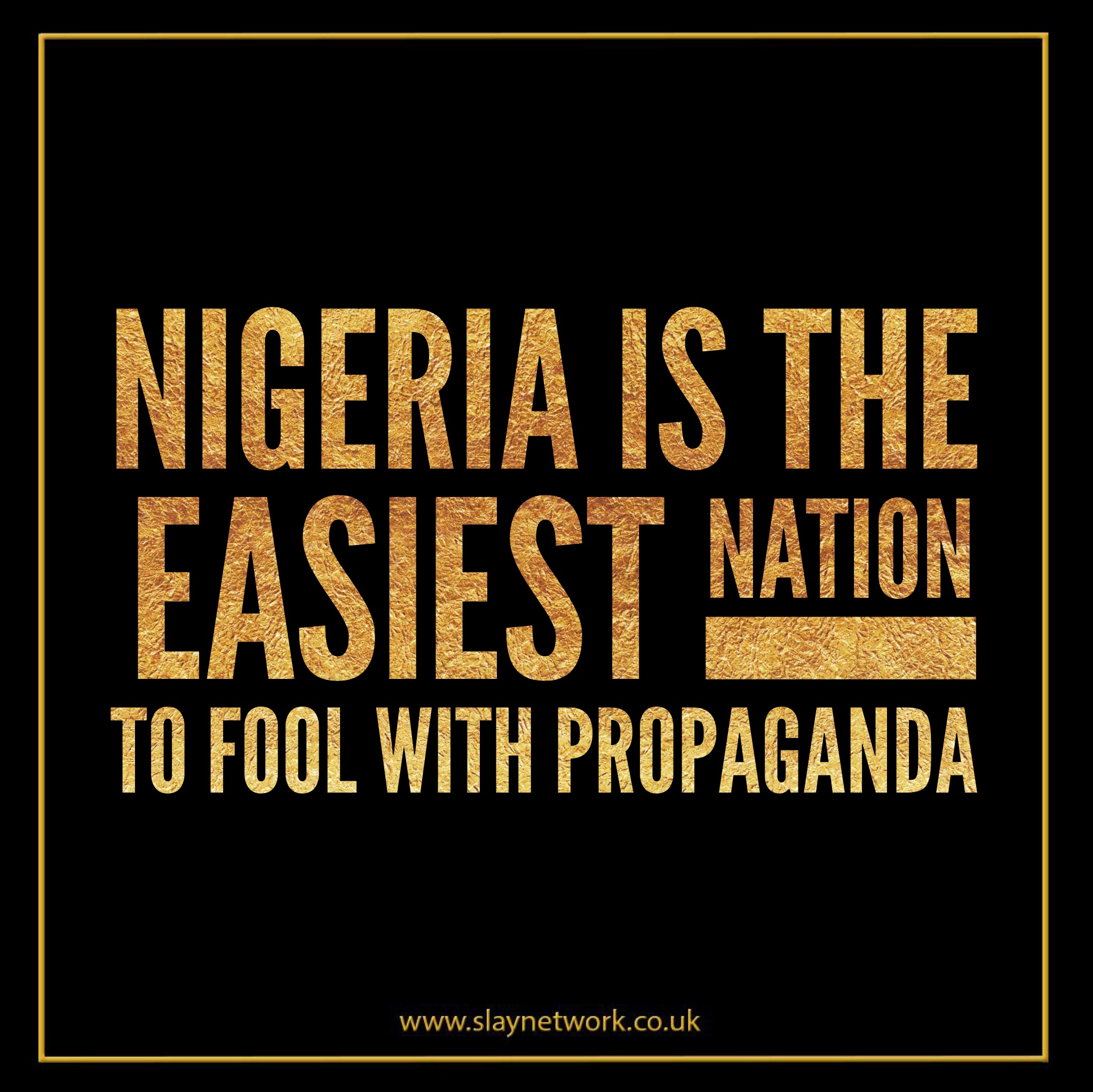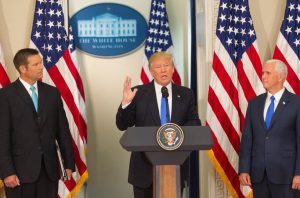
Read this intriguing and provocative piece; yet Nigerians refuse to be provoked instead holding one man, Buhari, responsible for all their woes!
How far can you push a Nigerian before he reacts like an angry lion?
Isn’t it a ridiculous mockery and insult that Nigerians are the only world citizens that when pushed to the wall, spend more energy to break the wall and cross over rather than fight back?
Read this and let’s know who our real enemies and shameless oppressors are – GOVERNORS, EX-GOVERNORS, SENATORS, REPS. Can’t we do something to get rid of these big thieves that use our power against us?
ENOUGH IS ENOUGH!
NIGERIANS WAKE UP!
A lion never shies away from a fight when it is hungry, neither does it blame the buffalo for resisting or refusing to be eaten.
How come our forefathers dared death and everything to give us a sane society?
Shaaaaaame!!!
Please endeavour to read this very interesting piece!
STATE OF THE NATION
A SELF DECEIVING COUNTRY CALLED NIGERIA
Twenty-one senators currently receiving pensions from government as ex-governors and deputy governors.
The current senators who once served as governors are Bukola Saraki of Kwara, Rabiu Musa Kwankwaso of Kano, Kabiru Gaya of Kano, Godswill Akpabio of Akwa Ibom, Theodore Orji of Abia, Abdullahi Adamu of Nasarawa, Sam Egwu of Ebonyi, Shaaba Lafiagi of Kwara, Joshua Dariye of Plateau Jonah Jang of Plateau, Aliyu Magatakarda Wamakko of Sokoto, Ahmed Sani Yarima of Zamfara, Danjuma Goje of Gombe, Bukar Abba Ibrahim of Yobe, Adamu Aliero of Kebbi, George Akume of Benue and Isiaka Adeleke of Osun.
The former deputy governors in the Senate are Ms Biodun Olujimi of Ekiti and Enyinaya Harcourt Abaribe of Abia. Danladi Abubakar Sani served as the acting governor of Taraba state.
Many former governors are also in Buhari’s Cabinet as Ministers. This includes: Ngige, Fayemi, Amaechi and Fashola (SAN).).
In Akwa Ibom State, the law provides that ex governors and deputy governors receive pension equivalent to the salaries of the incumbent. The package also includes a new official car and a utility vehicle every four years; one personal aide; a cook, chauffeurs and security guards for the governor at a sum not exceeding N5 million per month and N2.5 million for his deputy governor.
In Rivers, the law provides 100 percent of annual basic salaries for the ex-governor and deputy, one residential house for the former governor “anywhere of his choice in Nigeria”; one residential house anywhere in Rivers for the deputy, three cars for the ex-governor every four years and two cars for the deputy every four years.
It is alledged that in Lagos, a former governor will get two houses, one in Lagos and another in Abuja, estimated at N500 million in Lagos and N700 million in Abuja. He also receives six new cars to be replaced every three years; a furniture allowance of 300 percent of annual salary to be paid every two years, and a N30 million pension annually for life.
This is the reality for all the 21 ex govenors and deputy governors who are currently serving as senators. This same is also true of ex governors who are now serving as Ministers.
NOW I ASK:
How many years did these guys serve their states as governors and deputy governors? Is it more than 8years? Is that a reason to be entitled to pensions for life? Even if they are entitled to pension for life, must it be so outrageous?
As if that is not enough: HOW on earth can any public servant with conscience collect salaries and allowances as a senator or minister, and still have the audacity to claim pensions equivalent to the salaries of a serving governor in Nigeria?
IT ISN’T ROCKET SCIENCE……
Once you are elected a senator or appointed a minister, you must forfeit any pension accruing to you from government at any level until you vacate office. This should also apply to senators collecting military pensions like former Senate President David Mark.
Yet these senators are in the Senate that is inviting the current finance minister to discuss the recession of Nigeria’s economy. A senator pockets approximately 30 million naira monthly as salary and allowances. Our “honourables” are not interested to make laws that could restructure our country into economically autonomous federating States/Regions to save the country from sectional agitations that is threatening to destroy Nigeria. The sad and hopeless situation is that the rest of Nigerians are busy arguing based on party, ethnic and affiliations while these enemies of state continue to rape us.
Do you know that it costs tax payers 290m Naira yearly to maintain each member of our National Assembly in a country where nothing works & 80% of population earn below 300 Naira a day ? A working day earning of a senator is more than a yearly income of a doctor; it’s more than the salary of 42 Army generals or 48 professors or 70 commissioners of police or more than twice the pay of the US President or 9 times the salary of US congressmen.
It’s high time the country had a referendum on those outrageous salaries of Senators, House of Representative members and other political office holders.
*If you are seriously against the looting of our commonwealth in Nigeria, in the name of democracy, you can let this piece go viral by sharing it with as many of your contacts and groups too!*
By Victor Okechukwu Anyaegbuna
The rise and fall of Buhari

This write up coming from the London Economist, a magazine that endorsed Buhari for President in 2015, is perhaps the most significant, objective, unbiased, unsentimental and deeply incisive analysis of the policies and actions of this president so far. The facts are unimpeachable by any objective mind.
The Unprecedented Level of Patience Shown to Buhari---the ECONOMIST
Nigerians have never shown such level of patience and tolerance towards any of their past leaders for his record and strange policies as that shown to their current leader, Muhammadu Buhari – a former military dictator now self-confessed democrat who said he came to fight corruption.
Buhari, 75, is being plagued with failures across every single sector in the economy, the like as has never been seen before. Less than a year into office, the economy plummeted into recession, an economy which had till then grown at an average rate of 7% in previous years (2011-2014). The nation’s currency lost 70% of its value, unemployment rose from 6.5 to 26%, commodity prices tripled across many quarters and the state-regulated premium motor spirit prices were hiked by 67% without practically anybody batting an eye.
There have been stern opposition to his policies however and to his very personality as well, notably in the South East and South- South regions in the country as they are called, where he both received less than 5% of the votes cast at the last Presidential election and where he has always been sternly unpopular for his history of bigotry against the people, perceived incompetence and dictatorial tendencies. But in many other regions across the country the people have rather resolved to suffer patiently, drawing up excuses for him at will, blaming everyone including his hundreds of political appointees, anything and anybody but never the man himself.
Buhari’s party, the APC, promised Nigerians unprecedented swiping changes in government and the eviction of all corrupt individuals.
One possible explanation for this could be his party’s hope narrative in the 2015 General election where citizens were promised an unprecedented crackdown on corruption and the abolition of all government waste by a man whose financial worth they declared to have been less than N30million ($150,000 then), a historical low for a former top official in the country and most especially a former leader.
In a country plagued by acute corruption problems and with the unremitted crude oil revenue scandal of 2014 still fresh in the people’s minds, many were eager for an abrupt change, the like as never been seen before. He was seen an army general, already experienced in government, with a great strength of will, tough to take on the nation’s cabal of hardened criminals. He promised to appoint only technocrats to head the country’s departments and to see out the lingering Boko Haram insurgency from the warfront. For a nation lacking basic amenities such as power supply in spite of its huge energy resources and with the lingering insurgency crises, the choice seemed easy to many- the general with integrity was the man for the country.
Talk was cheap then but now reality has taken its course. His earliest opponents pointed out to his track record and not to his speech, noting that the last time Nigeria fell into dismal failure, currency woes and commodity shortages was when he had seized power as a military general in 1983 and stating that the facts of that record contradicted the poems of his image brokers.
Many however just wanted “change” as it was then called and so voted the General and sat to wait for the sung promises. But from the onset of his government, the course was as his critics had predefined: Incompetency, bigotry and dictatorial tendencies plaguing the country.
He ignored the newly born genocide in the middle belt of the country perpetuated by the Fulani herdsmen of his kindred against the Christian communities in Benue, Plateau and later on Kaduna. He breached the Central Bank’s 2007 Act of Independence, telling it to suspend forex disbursements to steel importers and other manufacturing sectors in a bid to defend the Naira, a disastrous action which kick-started a spiral of recession.
He took 3 months to appoint his Chief of Staff, 6 months to appoint a cabinet and now 23 months and yet counting to appoint heads of agencies and board members he was so eager to fire upon his assumption into office and rose import duties on the most basic of commodities in a bid to raise government revenue.
And as for the corruption fight, the facts on ground do not show any one at all. Apart from a few officials harassed or imprisoned without court order, the country is yet to witness the first victim of the said campaign at the court stands.
Government waste is on the rise, officials publicly caught in graft acts were swiftly excused, the 2016 Budget year passed without implementation and most worrisome, the Central Bank’s foreign reserves were being shared among unknown Bureau De Change operators at variable rates at the detriment of critical manufacturing, business and banking sectors.
The government continues to praise itself but the people seem to be increasingly tired of the paraded self-righteousness. The President’s recent illness was greeted with cheers by many. Many are just tired of the government. But the remarkable level of patience shown so far has been unprecedented and many a times the general reactions towards acts of constitutional violations was one of calmness or insensitivity.
If the Change narrative of the 2015 election and the songs of man of integrity are to account for this, then Nigerians may have just certified themselves on the world map as a nation easy to fool with propaganda. An adult should be judged on his track record not on his tongue.
Source: The Economist






